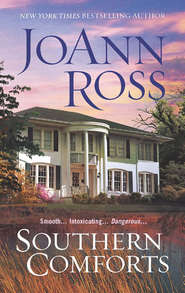По всем вопросам обращайтесь на: info@litportal.ru
(©) 2003-2024.
✖
Legacy of Lies
Автор
Год написания книги
2018
Настройки чтения
Размер шрифта
Высота строк
Поля
Back at her Montecito estate, she forced herself to remain calm as she accepted condolences from mourners. Finally, mercifully, everyone was gone, leaving her alone with Averill.
“Are you sure you want to stay here tonight?” His handsome face was stamped with professional and personal concern.
“Where would I go? This is my home.”
Needing something to do with her hands, Eleanor absently began rearranging a Waterford vase filled with white lilies. The house was overflowing with flowers; the rich profusion of sweet and spicy scents was giving her a blinding headache.
“Would you like some company?” Averill asked solicitously. “I’d be glad to stay.”
“No.” She shook her head. “I appreciate your concern, Averill, but if you don’t mind, it’s been a very long day and I’d like to be alone.” When he looked inclined to argue, she said, “I’ll be fine. Honestly.”
He frowned. “If you can’t sleep—”
“I’ll take one of those tablets you prescribed,” she assured him, having no intention of doing any such thing.
She’d succumbed to his medical prompting that first night, only to discover that the pills made her feel as if her head were wrapped in cotton batting. It was important she be alert when the police called to tell her they’d located Anna.
Although he appeared unconvinced, the young doctor finally left. Eleanor sat alone for a long silent time. After being in the public eye all day, she was grateful for the opportunity to allow herself to droop—face, shoulders, spirits.
Finally, when she thought she could manage the act without collapsing, she got to her feet and climbed the elaborate Caroline staircase to the nursery, where she kept her vigil far into the night.
Chapter One
Paris
December 1981
Oblivious to any danger, Alexandra Lyons ran full tilt across the icy street, deftly weaving her way between two taxis, a gunmetal-gray Mercedes and a jet-black Ferrari. Her hooded, red wool cape was like the brilliant flash of a cardinal’s wing against the wintry gray Paris sky and the falling white snow.
Her long legs, clad in opaque black tights and pointy-toed red cowboy boots, earned a quick toot of the horn and an admiring second look from the driver of the Ferrari.
It was Christmas in Paris. Glittering semicircles of Christmas trees had replaced Rond Point’s formal gardens, and garlands of lights had been strung up in the city’s leafless trees, turning the Avenue Montaigne and the Champs-élysées into great white ways, reminding one and all that Paris was, after all, the City of Light.
But Alex’s mind was not on the lights, or the joyful season. Her concerns were more personal. And far more urgent.
She was on her way to the atelier of Yves Debord to try again to win a coveted position with the French designer. And though she knew her chances of winning a position at the famed house of couture were on a par with catching moondust in her hand, even worse than failing would be to grow old and never have tried.
Emerging ten years ago as haute couture’s enfant terrible, the designer had been immediately clutched to the décolleté bosom of the nouveaux riches. Fashion celebrity oozed from the perfumed corners of his atelier, glinted off the windshield of his Lamborghini, glowed from the crystal chandeliers in his many homes.
Hostesses in Los Angeles, Dallas and New York fawned over him. He skied in the Alps with movie stars and was welcome at presidential dinner tables in Rome and Washington and Paris.
During Alex’s student days in Los Angeles, the Fashion Institute had shown a documentary about the designer directed by Martin Scorsese entitled Pure Pow: The World of Debord. Enthralled, Alex had sat through all three showings.
She now paused outside the showroom to catch her breath. Adrenaline coursed through her veins at the sight of her idol’s name written in gleaming silver script on the black glass.
“You can do it,” she said, giving herself a brisk little pep talk. “The answer to all your dreams is just on the other side of this door. All you have to do is to reach out and grasp it.”
She refused to dwell on the fact that after months of daily visits to the bureau de change to cash her dwindling supply of traveler’s checks, she was almost out of funds.
Her night job, serving beer and wine at a Montparnasse nightclub, barely paid her rent. The hours, however, allowed her to search for work in the fashion houses during the day, and if sleep had become a rare, unknown thing, Alex considered that a small price to pay for a chance to fulfill a dream.
Throwing back her shoulders, Alex lifted herself up to her full height of five feet seven inches and then, with her usual bravado, entered the showroom. Behind her, the door clicked shut with the quiet authority of a Mercedes.
The front room, used to greet customers, was a vast sea of cool gray. Modern furniture wrapped in pewter fabric sat atop silvery gray carpet that melded into the gray silk-covered walls. Marie Hélène, Yves Debord’s sister and house of couture directress, was seated behind a jet lacquer table.
She was dressed in black wool jersey, her platinum hair parted in the center and pulled into a severe chignon at the nape of her swanlike neck.
When she recognized Alex, she frowned.
“I know,” Alex said, holding up a gloved hand to forestall the director’s complaint. She pushed back her hood, releasing a thick riot of red-gold hair.
“You’ve told me innumerable times in the past six months that there aren’t any openings. And even if there were, you don’t take Americans. But I thought, if you could only take a look at my work—” she held out her portfolio “—you might consider showing my designs to Monsieur Debord.”
Alex’s chin jutted out as she steeled herself for yet another cool rejection. Nothing ventured, nothing gained.
To Alex’s amazement, Marie Hélène didn’t immediately turn her away as she had all the other times. “Where did you say you studied?” she inquired in a voice as chilly as her looks.
“The Fashion Institute. In L.A.”
“Los Angeles,” the directress said with a sniff of disdain, as if Alex had just admitted to being an ax murderer. “You’re very young,” she observed, making Alex’s youth sound like a fatal flaw. “When did you graduate?”
“Actually, I didn’t. I felt the curriculum put too much emphasis on merchandising and too little on technique.” It was the truth, so far as it went. “Besides, I was impatient, so I quit to go to work in New York.”
She felt no need to volunteer that a more urgent reason for leaving school had been her mother’s diagnosis of ovarian cancer.
As soon as Irene Lyons had called her with the dark news, Alex had gone to the registrar, dropped out of school and, with a recommendation from one of her professors, landed a job with a Seventh Avenue firm that made dresses for discount stores.
“New York?” Marie Hélène’s brow climbed her smooth forehead. “Which designer? Beene? Blass? Surely not Klein?”
“Actually, I worked for a company that made clothing for department stores.”
She lifted her chin, as if daring Marie Hélène to say a single derogatory word. While not couture, she’d worked damned hard. And although her suggestions to bring a little pizzazz to the discount clothing were more often than not rejected, she was proud of whatever contribution she’d been allowed to make. After her mother’s death, no longer having any reason to remain in New York, she’d followed her lifelong dream, making this pilgrimage to the birthplace—and high altar—of couture.
“But I continued to design on my own,” she said, holding out the portfolio again.
When the directress continued to ignore the proffered sketches, Alex steeled herself to be rejected once more.
Instead, Marie Hélène rose from her chair with a lithe grace any runway model would have envied and said, “Come with me.”
Unwilling to question what had changed the director’s mind, Alex rushed after her through the labyrinth of gray walls and silver carpeting. They entered a small Spartan room that could have doubled as an interrogation room in a police station. Or an operating room.
Though the steel shelves on the walls were filled with bolts of fabric, there was not a speck of lint or dust to be seen. Open-heart surgery could have been done on the gray Formica laminated plastic table in the center of the room.
Beside the table was a faceless mannequin. Marie Hélène took a bolt of white toile from one of the shelves, plucked a sketch from a black binder, lay both on the table along with a pair of shears and said, “Let us see if you can drape.”
“Drape? But I came here to—”
“I had to dismiss one of our drapers today,” the directress said, cutting Alex off with a curt wave of her hand.











